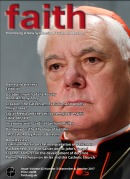
Book Review
The vulnerability, fragility, tenderness and absolute love of Jesus
The Gospel of John, the Gospel of Relationship by Jean Vanier, Darton, Longman and Todd, pp.129, £9.99.
reviewed by Pia Matthews
Jean Vanier’s gentle book on the Gospel of John focuses on themes that Vanier holds dear to his heart. Vanier, the founder and inspirer of L’Arche communities, where people with and without intellectual disabilities share daily life together, is particularly interested in relationships, human vulnerability and fragility. It is perhaps of no surprise that he sees the Gospel of John as the Gospel of relationship. Vanier is a prolific author, and this slim volume is a transcript of videos that he put together on a pilgrimage to the Holy Land. The flavour of the book is very much to situate reflection on the flow of John’s Gospel into the concrete reality of life and living together.
In exploring the richness of this gospel Vanier pulls on the threads of vulnerability, fear, welcoming others as beautiful, accepting brokenness, the spirituality of loss, dying to self, and the problems of power in relationships. Naturally he makes special reference to his own personal experience in the communities of L’Arche and the stories of the people who live there. However, perhaps most significantly and particularly since the Jesus of St John’s Gospel is often portrayed as a strong figure who carries his own cross, from the beginning of the Gospel to its end, Vanier dwells on the vulnerability, fragility, tenderness and absolute love of Jesus.
Touchstones for our lives
Vanier explains that St John’s method is to give an account of an event that is then over-laden with reference and symbolism. Similarly, as Vanier follows St John’s Gospel he aligns events with parallel texts from the other gospels and the Old Testament, and he links in an array of personal reflections that spring to him from the text. These range from stories of the saints, to concerns of people today, to a look at his own personal experience as a child and with L’Arche, all the way to broader comment on resistance to the Nazis, the war in Rwanda, and the conflict in present day Israel and Palestine, and he sees in the Gospel many touchstones for our modern lives. With St John, Vanier aims to present a passionate Jesus who wants to liberate people and give them the fullness of life.
According to Vanier the significance of calling St John’s Gospel the Gospel of Relationship lies in the fact that all relationships transform us, albeit imperfectly. However, through a personal relationship with Jesus we come to discover that we gradually need to be transformed by grace, body and soul, to enter into the fullness of love. From the beginning Vanier presents a very human Jesus who understands our human condition, the Logos who becomes a fragile human being, enabling each one of us to realise that we are all beautiful children of God no matter what our human condition or situation.
The sadness of Jesus
As the Gospel progresses Vanier shows that Jesus calls each one of us to be a witness to him and that in this witnessing the weak and rejected have a central place. As Jesus’ action at the wedding at Cana reminds us we, like the water, need to be transformed into wine, and as the story of the Samaritan woman at the well shows we are all wounded people in need of healing and love. Vanier finds tenderness in Jesus the Good Shepherd who teaches us all to be both caring shepherds yet also sheep obedient to the Holy Spirit. Strikingly, Vanier calls attention to both the deep communion that Jesus offers us and Jesus’ own vulnerability when he grieves for his dead friend Lazarus (who Vanier suggests may have had a learning disability since unusually for the time he lived with his two sisters), and when Jesus is personally wounded by broken communion and the betrayal of Judas.
In particular Vanier brings out the profound sadness of Jesus as, through fear and a closed mentality, people build up their own walls that destroy trust in him or put up their own barriers to shut out love: in his description of the washing of the feet, Vanier looks at Peter who does not understand weakness until he is filled with the Holy Spirit, Judas who cannot tolerate love and kindness, and John who eventually abandons himself to Jesus and knows he is loved by him. Vanier offers his experience of the L’Arche community where people live by the heart rather than in fear to show that living without barriers and in trust is possible and to demonstrate that God loves us for who we are and not for what we can do.
Being-with rather than doing-for
Vanier is a realist who understands that at times anguish cannot be removed, and he draws attention to the presence of Mary, Mother of Jesus standing at the foot of the cross as a sign of compassion and a profound being-with, rather than doing-for, that so often accompanies those who suffer alongside others. St John’s account of the resurrection and encounter of Jesus with Mary of Magdala in the garden where Jesus calls Mary by name becomes for Vanier a sign of hope for us all, and when the disciples react with disbelief and ridicule at Mary’s good news Vanier is reminded of the tensions in all human communities that can only be transformed by living in the Spirit who is sent by Jesus as a sign of his undying love for his followers.
Vanier’s book ends as does the Gospel of John with Jesus asking Peter about love and service, but the last comment rests on the beloved disciple, St John himself, whose gospel shows us that Jesus calls us to be his beloved friends. A simple yet deeply thought out and felt book, Vanier’s Gospel of John, the Gospel of Relationship reminds us that we are all called to do the work of Jesus in revealing the God of goodness, compassion and forgiveness who leads us to a life of relationship.
Notes:
Dr Pia Matthews lectures at St Mary’s University, Twickenham and St John’s Seminary, Wonersh.





